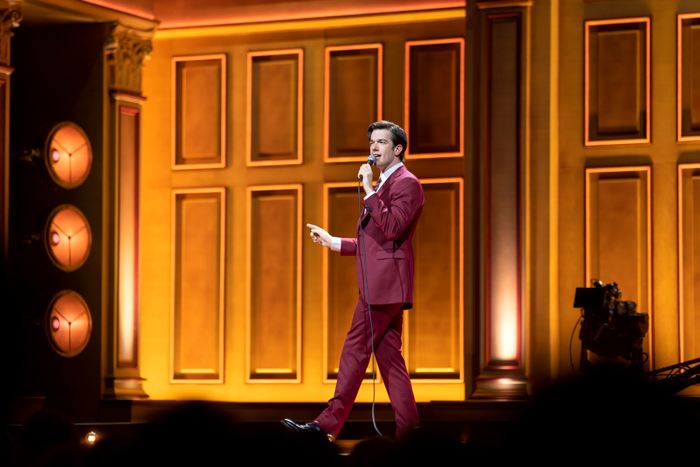
Baby J, the latest stand-up from John Mulaney, is a herculean effort, but what exactly that effort aims to achieve is not entirely clear. After his highly public, intensely tumultuous past several years — an intervention, a long period in rehab, a divorce, a sudden new relationship, a new baby — the special is both a presentation of who the comedian and actor was during that period and an attempt to align that person with who he is now. It’s designed as a self-examination: He wants to be able to laugh at that guy he used to be and for the audience to laugh at that guy too. So he tries to create a lot of space between them. That Mulaney who was addicted to substances? He’s certainly related to the guy standing onstage, but he’s not quite the same. He’s an object to be held up and tut-tutted over, a guy we can laugh at safely now because he no longer exists.
Some distance from a past self is necessary in this kind of storytelling — without it, there’s just a rattling off of events with no room for artistic transformation. But Mulaney attacks Baby J less like a product of creative consideration and more as if he’s examining a severed limb. He is so entirely, confidently unruffled. His sharp suit and shiny dress shoes are back; he’s on the big Boston Symphony Hall stage. Inside the stories he tells is the implication that we should now understand that this old-timey soft-shoe act was always a cover for some very dark stuff. And yes, maybe all this is an attempt to reconcile the Mulaney everyone knew onstage with the Mulaney who lived behind the scenes. The act has returned, but this time it’s fine! See, look — there’s so much distance! We can laugh now! Except when you create that much separation between who you are and who you were, reconciliation starts to look like dissociation.
Confessional comedy is a whole wing of stand-up (going back at least as far as Richard Pryor talking about shooting at his wife’s car), and it’s true that some amount of distance is key to making the story of that earlier guy funny. He’s too present, his emotions and flaws too visible. It’s This isn’t funny to me yet, but I’ll be able to laugh about it tomorrow codified into art, and the gift to audiences is that they always get to live in “tomorrow.” In that sense, Baby J is a work of crystal clarity. Present Mulaney has captured Past Mulaney, then packaged, polished, and honed that guy down to a few core qualities, shaping it all into beautiful anecdotes that look, in summary, like personal disclosures. Detailed recovery retellings along with a mortifying story about what he did to get cash to buy drugs? From way up in the mezzanine, that looks like vulnerability, baby!
That does seem to be Baby J’s ostensible intent. “The past couple years, I’ve done a lot of work on myself,” Mulaney begins, “and I’ve realized that I’ll be fine as long as I get constant attention.” This is his most intimate idea, the realization that fuels everything that came before Baby J and everything this work will then attempt to unpack. By placing it at the opening, in the space usually for throat-clearing, it’s as though Mulaney voices this and then attempts to run as far away from it as possible. He’s hardly alone in this idea — James Acaster’s 2021 special plays with it, and it’s most familiar from Bo Burnham’s work (especially his Kanye-inspired “Can’t Handle This” song). Mulaney even names Burnham in Baby J, though he does so in a tossed-off line about how kids prefer Burnham’s stuff because “he’s currently less problematic.” But the special is nearly an hour and a half of Mulaney voicing this fundamental need that has driven his career, describing the incredible damage and near catastrophe it has caused him and refusing to explicitly connect those ideas to either his past behavior or his current self.
The special has two components: “Baby J” is Mulaney himself, an invitation for tenderness that’s also a flippant piece of ironic detachment when it finally arrives in the context of a joke. The other — the trailer’s tagline, “a wide-ranging conversation” — works in the same way. It’s a tonal tip-off that the special is meant to grapple with serious, darker thematic ideas — except that when that tagline appears, it’s also Mulaney dunking on a low moment from his former self. This hyperaware detachment is a constant. “I’ve had a weird couple years; you’ve had a weird couple years,” Mulaney says early on before breaking into a kind of music-hall-style song and dance: “You know what I mean / We all quarantined / We all went to rehab and we all got divorced and now our reputation is diff-rent!” It is funny, and it is also very sad, and Mulaney seems desperate to tap-dance over the sadness of it. “Likability is a jail!” he sings, miming the doff of a hat.
Before launching into the bulk of the special, which features a celeb-studded intervention and his certainty that he would be recognized while in rehab, Mulaney looks into the crowd, spots a young kid up in one of the balconies, and addresses him from the stage. The kid is named Henry, and he’s 11. The crowd laughs uncomfortably, but this is exactly the tension Mulaney is most interested in: His reputation was as a comedian young Henry could enjoy; now Mulaney has to explain that, actually, he’s someone else. Everyone gathered in the theater and around their screens knows this is what they’ve all come to watch. The clean man admits he has never been clean. “Well, Henry,” Mulaney says, “if you’ve seen me do stand-up before, I have kind of a different vibe now. When I was a younger man, I’d come out onstage and be like, ‘Hey! Ba ba ba ba-ba!’” Mulaney leaps around the stage, making the line a sped-up vaudevillian patter emptied of meaning. “And I wonder what caused that,” he says as the audience laughs.
Except his new vibe isn’t that different. Sure, the content has changed. (There’s a story about doing coke off one of the diaper-changing stations in a public restroom.) But it’s as though we’re supposed to forget that only moments before asking us to reconsider the rattling old-school prattle of his earlier specials, Mulaney does the exact same thing, dancing across the stage and singing about the prison of approval.
Baby J wears its hard work on its sleeve, but most visible is a trap Mulaney doesn’t know how to evade — one that might not be possible to avoid for anyone. If he had come out of the past few years with an entirely different persona, a wholly new Mulaney who wears ratty T-shirts and sits on a stool and speaks for endless, laughless minutes about his newfound sobriety and sense of self, the line would be that the old Mulaney was gone and his audience missed him. Worse, it could so easily look like a performance of authenticity rather than a display of vulnerability. So instead of that particular frying pan, Mulaney jumped in the opposite direction and ended up in the fire anyhow, attempting to disclose his inner life but instead making a show of his divorcement from it. At moments, or from a slight remove, Baby J appears to be an excoriating act of self-disclosure full of details and scenes of abject emotional lows that invite descriptions like brutal and honest. Up close, though, it looks like a comedy special that cannot help but rebuild every single wall it wants to break down.





